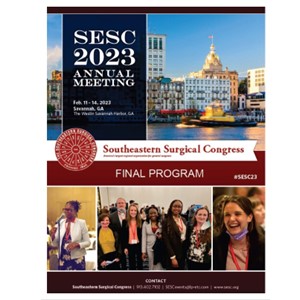Back
Colorectal
Category: Crazy Videos & Cases Session
Quickshot Oral : Crazy Videos & Cases Session
C 6 - ROBOTIC RIGHT COLECTOMY FOR ASCENDING COLON NEOPLASM INVOLVING ABDOMINAL WALL
Saturday, February 11, 2023
5:50pm – 6:00pm East Coast USA Time
- AF
Andrea Fa, MD
Resident
Vanderbilt University Medical Center, United States - AF
Andrea Fa, MD
Resident
Vanderbilt University Medical Center, United States
Presenter(s)
Principal Contact(s)
Objectives: Introduction
We present a case of an en-bloc resection of a perforated ascending colon cancer and abdominal wall using minimally invasive techniques.
Case Presentation
Our patient is a 67-year-old woman who presented to her PCP for a 6-month history of right-sided abdominal pain, decreased appetite, and approximate 25 lb weight loss. A CT abdomen/pelvis revealed a cecal mass that had perforated into the abdominal wall resulting in a large multiloculated abscess measuring 5x7x6cm. Colonoscopy showed a nearly obstructing, fungating mass in the cecum. Her staging workup was negative for distant metastases. Pathology returned as tubulovillous adenoma with high-grade dysplasia. During her workup, she was admitted via ED due to signs of sepsis. She underwent percutaneous drainage of the abdominal wall abscess and was started on antibiotics. The IR approach was direct as possible to minimize the potential seeding along the drainage tract. Her case was discussed at multidisciplinary conference. Given her overall clinical picture, the decision was made to proceed with en-bloc resection of the cecal mass, abdominal wall, and IR drain tract. Intraoperative findings were encouraging as there was no evidence of peritoneal or liver surface disease. Complete resection was performed, and all frozen sections from the abdominal wall margins were negative. The ileocolonic anastomosis was performed intracorporeally. The resulting abdominal defect was 14cm in length by 6cm in width. Given the contaminated nature of the case and the potential risk of recurrent tumor in the abdominal wall, mesh was avoided. The defect was repaired primarily after mobilization of subcutaneous flaps. . She recovered well from the surgery and was discharged home on POD 2.
Final pathology demonstrated moderately differentiated adenocarcinoma of the cecum (T2N0M0, stage 1). All margins were negative. She was seen post-operatively and was progressing well. She will follow up with a repeat colonoscopy in 1 year. No adjuvant chemotherapy was recommended after discussion at multidisciplinary tumor board.
Discussion
At time of presentation, up to 15% of all colon cancers are locally advanced. Historically, an open surgical approach is used in these cases due to concerns for oncological adequacy. However, MIS techniques have shown advantages in early postoperative outcomes, and recent studies have indicated the adequacy of laparoscopic surgery for oncological resection. This case demonstrates a safe approach while minimizing morbidity and preserving oncologic outcomes. Robotic surgery can be safe and overall beneficial for patients presenting with locally advanced colon cancer.
Methods:
Results:
Conclusion:
We present a case of an en-bloc resection of a perforated ascending colon cancer and abdominal wall using minimally invasive techniques.
Case Presentation
Our patient is a 67-year-old woman who presented to her PCP for a 6-month history of right-sided abdominal pain, decreased appetite, and approximate 25 lb weight loss. A CT abdomen/pelvis revealed a cecal mass that had perforated into the abdominal wall resulting in a large multiloculated abscess measuring 5x7x6cm. Colonoscopy showed a nearly obstructing, fungating mass in the cecum. Her staging workup was negative for distant metastases. Pathology returned as tubulovillous adenoma with high-grade dysplasia. During her workup, she was admitted via ED due to signs of sepsis. She underwent percutaneous drainage of the abdominal wall abscess and was started on antibiotics. The IR approach was direct as possible to minimize the potential seeding along the drainage tract. Her case was discussed at multidisciplinary conference. Given her overall clinical picture, the decision was made to proceed with en-bloc resection of the cecal mass, abdominal wall, and IR drain tract. Intraoperative findings were encouraging as there was no evidence of peritoneal or liver surface disease. Complete resection was performed, and all frozen sections from the abdominal wall margins were negative. The ileocolonic anastomosis was performed intracorporeally. The resulting abdominal defect was 14cm in length by 6cm in width. Given the contaminated nature of the case and the potential risk of recurrent tumor in the abdominal wall, mesh was avoided. The defect was repaired primarily after mobilization of subcutaneous flaps. . She recovered well from the surgery and was discharged home on POD 2.
Final pathology demonstrated moderately differentiated adenocarcinoma of the cecum (T2N0M0, stage 1). All margins were negative. She was seen post-operatively and was progressing well. She will follow up with a repeat colonoscopy in 1 year. No adjuvant chemotherapy was recommended after discussion at multidisciplinary tumor board.
Discussion
At time of presentation, up to 15% of all colon cancers are locally advanced. Historically, an open surgical approach is used in these cases due to concerns for oncological adequacy. However, MIS techniques have shown advantages in early postoperative outcomes, and recent studies have indicated the adequacy of laparoscopic surgery for oncological resection. This case demonstrates a safe approach while minimizing morbidity and preserving oncologic outcomes. Robotic surgery can be safe and overall beneficial for patients presenting with locally advanced colon cancer.
Methods:
Results:
Conclusion:

